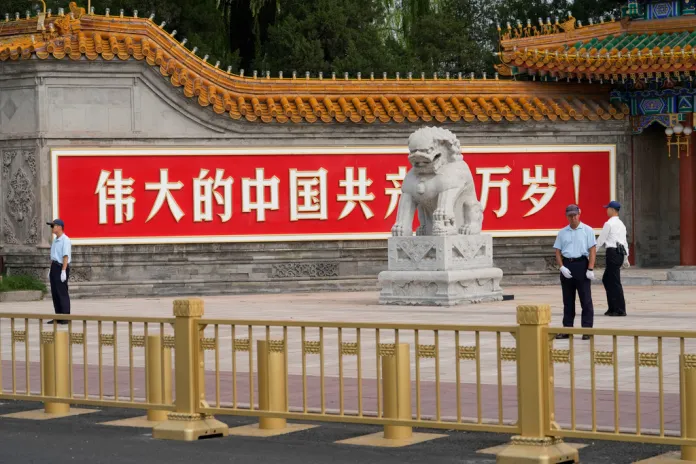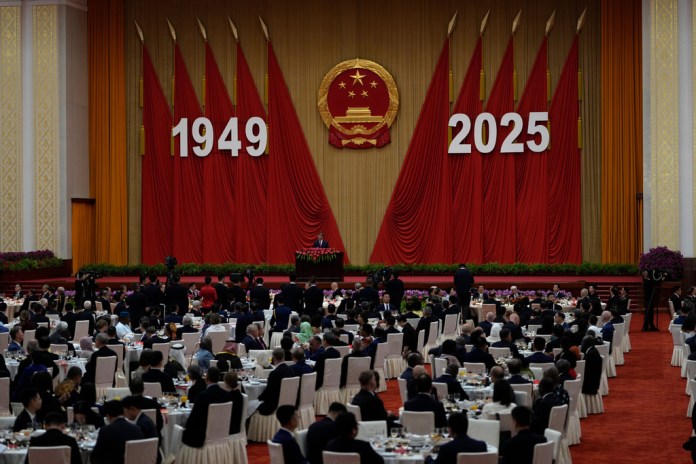Once an engine of radical social upheaval, the Chinese Communist Party is coaxing its citizens toward conservative lifestyles in line with its traditional culture.
China banned LGBT dating apps Blued and Finka this week, the latest targets of a yearslong effort to curb the promotion of homosexual culture in the country. Apple confirmed the removal of the apps from its platform, citing pressure from the CCP.
“We follow the laws of the countries where we operate. Based on an order from the Cyberspace Administration of China, we have removed these two apps from the China storefront only,” an Apple spokesperson announced.

The Cyberspace Administration is the national internet regulation body of the CCP, tasked with censoring and curating the Chinese net in accordance with government mandates.
Homosexuality in China exists in a limbo between social acceptability and taboo. It was legalized in 1997, but Beijing has sought to curb public exposure of LGBT organizations, art, and activism. Homosexual marriage is not recognized.
Jack Burnham, a research analyst in the Foundation for Defense of Democracies’ China Program, said that this posture fits into the CCP’s development of a “very culturally conservative worldview” that rejects influences deemed “not Chinese.”
“The CCP in the ’90s to 2000s was a little more lenient around LGBTQ people,” Burnham told the Washington Examiner. “But once [Chinese President] Xi Jinping came into power, he really did have a more conservative attitude around these types of things, and he started to see kind of a snowball effect around the silencing of LGBTQ voices within China.”
Blued and Finka are not the first homosexual dating platforms to be censored by the CCP. Grindr was banned in 2022 ahead of the Beijing Winter Olympics — just days after the Cyberspace Administration promised to “vigorously purify the online ecosystem.”
At the time, observers speculated that the Grindr ban had little to do with cultural values and was more focused on security, citing the app’s lack of compliance with the nation’s Personal Information Protection Law.
Without no obvious parallels in the case of Blued and Finka, it seems that social value concerns are indeed driving the CCP’s censorship on LGBT platforms.

Similar campaigns have been widely documented in Russia, where the government has used its relationship with the Orthodox Church to promote socially conservative values and traditionalist sentiment among its population.
The CCP, an atheistic government, is perhaps less concerned with the moral question of homosexuality than with the social ramifications. Leaders see modern initiatives such as Pride parades, hook-up apps, and LGBT rights campaigns as a distinctly foreign development being imported into the country.
“It’s not so much that it’s rooted in religious aspects, though there may be religious undertones,” Burnham told the Washington Examiner. “It’s more rooted in a very strong focus on preserving this traditional — even in some ways, almost ancient — type of society that was ordered around having obedience to a strong father figure [and] having a mother that took care of children.”
The Communist Revolution, rooted in the Western ideology of Marxism-Leninism imported from Europe, advocated a total rejection of native, Imperial-era customs and social structures. This was epitomized in its campaign against the “Four Olds” — old customs, old culture, old habits, and old ideas.
But in the decades since the People’s Republic of China was established, the communist elites have quietly abandoned this rhetoric of breaking with the past and instead embraced a civic mythology championing “5,000 years of Chinese civilization” and a skepticism of foreign influences.
TV regulators previously ordered broadcasters to “resolutely put an end to sissy men and other abnormal esthetics” on public channels.
Whereas the first chairman of the PRC, Mao Zedong, used the phrase “women hold up half the sky” to urge female citizens into factories and farm labor, the modern Politburo suggests that women study Xi’s political philosophy to “establish a correct outlook on marriage and love, childbirth and family.”
Xi’s emphasis on childbearing is no doubt influenced by China’s grim population projections, which led the CCP to abandon the disastrous one-child policy it introduced in 1979.

This reorientation toward the traditional can also be seen in the rehabilitation of Confucius, the seminal philosopher of Chinese history.
China’s foreign study programs, dubbed “Confucius Institutes,” aim to capitalize on the philosopher’s name recognition abroad while transmitting pro-China narratives drafted by communist academics.
Mao once deemed the ancient scholar and his teachings to be “feudal poison,” but Xi attends Confucius festivals as a guest of honor and advocates “using the past to serve the present.”
“The CCP project is very much melding these kind of socialist ideological tenets with what they view as the best aspects of a Chinese society and Chinese culture that has adapted over thousands and thousands of years,” Burnham explained.
If foreign influence and social decline are at the root of China’s opposition to Blued and Finka, a mirrored campaign against such ills is being fought against Beijing in the United States.
President Donald Trump approved a deal last month that would spin off the Chinese-owned app TikTok into a majority U.S.-owned entity.
BELTWAY CONFIDENTIAL: WHY CHINA REMAINS INCANDESCENT OVER JAPAN’S COMMENTS ON TAIWAN
White House press secretary Karoline Leavitt said that the new American board of directors would maintain control over the app’s algorithm, which has been accused of feeding users harmful, antisocial content.
The Office of the Director of National Intelligence released a report in 2024 that found the Chinese government was using the app to promote pro-Chinese views and exert influence over U.S. political discourse.























